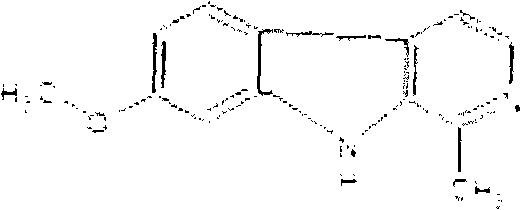Preparation method of dehydro-harmine
A technology of dehydrohaeline and camel calla, which is applied in the direction of organic chemistry, can solve the problems of low specificity of dehydrohamateline, complicated preparation process, and small preparation amount, and achieve reduction of chloroform extraction times and dosage, preparation Large amount, reduce the effect of oil dissolution
- Summary
- Abstract
- Description
- Claims
- Application Information
AI Technical Summary
Problems solved by technology
Method used
Image
Examples
Embodiment 1
[0022] Take Camelia seeds, crush them, weigh 200g, add 50ml of 5% ammonia water, mix well and ammonify for 20 hours, add 1000ml of 80% methanol solution to soak for 12 hours, filter, add 600ml of 80% methanol for 2 times, combine the extracts, filter, add 400ml of chloroform solution was stirred, and after standing to separate layers, the chloroform layer was collected, and the chloroform was recovered to obtain 8.2g of solid matter. Take petroleum ether, ethyl acetate, methanol, and water and mix them according to the ratio of 17:29:26:16. Take the upper phase as the stationary phase and inject it into a high-speed countercurrent chromatograph at a speed of 800r / min. The lower phase is the mobile phase with a flow rate of 2ml / min. , dissolving the sample with methanol, injecting the sample to separate the sample, collecting the dehydrohaeline fraction, recovering the reagent, and drying in a vacuum at low temperature to obtain 6.1 g of dehydrohaeline, the content of which was ...
Embodiment 2
[0024] Take Camelia seeds and crush them, weigh 200g, add 40ml of 15% ammonia water, mix well and ammonify for 10 hours, add 1000ml of 80% methanol solution to soak for 15 hours, filter, add 1000ml of 80% methanol for soaking, combine the two extracts, filter, add 450ml of chloroform solution was stirred, and after standing to separate layers, the chloroform layer was collected, and the chloroform was recovered to obtain 9.2g of solid matter. Take petroleum ether, ethyl acetate, methanol, and water and mix them according to the ratio of 17:29:26:16. Take the upper phase as the stationary phase and inject it into a high-speed countercurrent chromatograph at a speed of 850r / min. The lower phase is the mobile phase with a flow rate of 2ml / min. , the sample was dissolved in methanol, the sample was injected to separate the sample, the dehydrohaeline fraction was collected, the reagent was recovered, and dried in a vacuum at low temperature to obtain 6.8 g of dehydrohaeline, the con...
Embodiment 3
[0026] Take Camelia seeds and crush them, weigh 500g, add 100ml of 10% ammonia water, mix well and ammoniate for 15 hours, add 2500ml of 70% methanol solution to soak for 15 hours, filter, add 2500ml of 70% methanol to soak, combine the two extracts and filter, Add 1200ml of chloroform solution and stir, after standing to separate layers, collect the chloroform layer, recycle the chloroform to obtain 31.4g of solid. Take petroleum ether, ethyl acetate, methanol, and water and mix them according to the ratio of 17:29:26:16. Take the upper phase as the stationary phase and inject it into a high-speed countercurrent chromatograph at a speed of 900r / min. The lower phase is the mobile phase with a flow rate of 3ml / min. , dissolving the sample with methanol, injecting the sample to separate the sample, collecting the dehydrohaeline fraction, recovering the reagent, and drying in a vacuum at low temperature to obtain 13.1 g of dehydrohaeline, the content of which was detected by high-...
PUM
 Login to View More
Login to View More Abstract
Description
Claims
Application Information
 Login to View More
Login to View More - R&D
- Intellectual Property
- Life Sciences
- Materials
- Tech Scout
- Unparalleled Data Quality
- Higher Quality Content
- 60% Fewer Hallucinations
Browse by: Latest US Patents, China's latest patents, Technical Efficacy Thesaurus, Application Domain, Technology Topic, Popular Technical Reports.
© 2025 PatSnap. All rights reserved.Legal|Privacy policy|Modern Slavery Act Transparency Statement|Sitemap|About US| Contact US: help@patsnap.com

